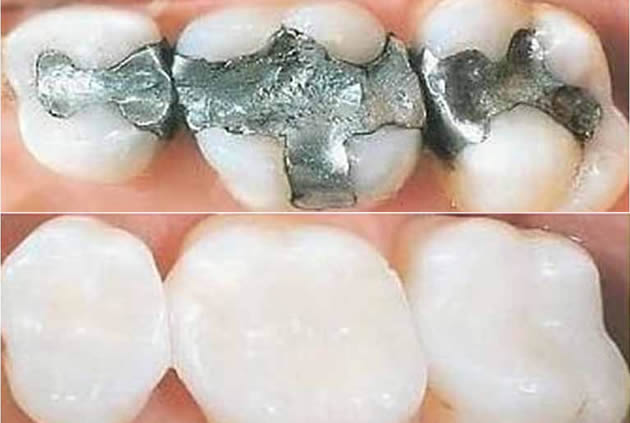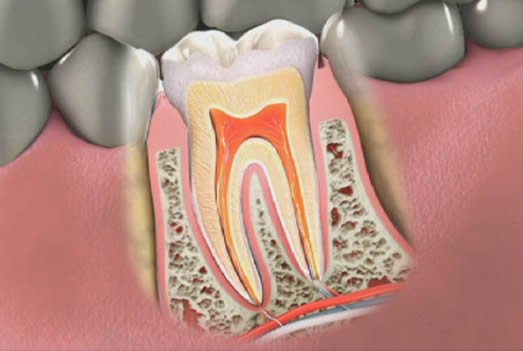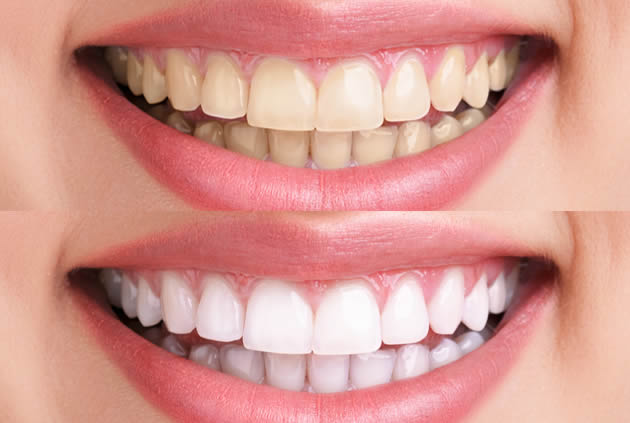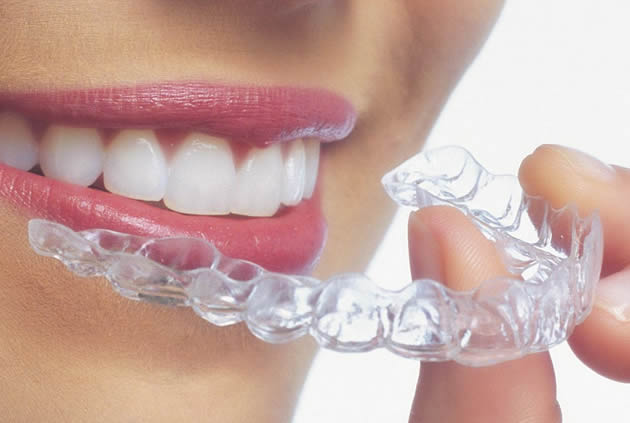
In the past, replacing lost teeth meant getting dentures or bridges. Even though these offered the best way at the time to restore your mouth’s appearance and function, technology has improved through the development of dental implants. The main drawbacks of bridges and dentures is that they do not feel or look just like real teeth, and it is difficult to chew tough foods. The advantage of implants is that they look and perform so well that you can’t even tell they are not your natural teeth.
Made from titanium, dental implants are screws that are surgically placed directly into your jawbone. They are light and malleable, but durable and strong. The titanium screws are implanted into your jawbone and given time to heal. Once healing is complete, one or multiple crowns are placed on top of the implant to recreate your missing teeth. One implant can hold more than one screw, so it is possible to attach as many crowns as needed to replace your missing teeth.
Dental implants look so much like real teeth that others won’t even be able to tell that you have any artificial teeth. You might even forget about it yourself, as they feel real as well. Since the implants are securely placed in your jaw, they are as strong as real teeth and you are able to chew and bite anything that you would normally eat. Another great thing about implants is that they don’t impact any of your adjacent healthy teeth. While bridges and dentures can sometimes damage neighboring teeth because those teeth are necessary for support, implants avoid this problem. You are left with a fully restored and comfortable smile.
We look forward to seeing you in our Baltimore dental office

Have you been told that you may need a root canal treatment? Are you worried because of things you’ve heard in the media about how “awful” a root canal is? Don’t worry about what you’ve heard; endodontic therapy isn’t at all what you’d think. Let’s debunk some myths!
- Myth #1: Root canal treatment is very painful. This isn’t true! In fact, a root canal treatment is performed specifically to relieve a patient’s pain, not to cause more. After a root canal treatment, you might feel some tenderness, but the pain you felt when the damaged tissue and infection was still inside the tooth will be completely gone. Once the swelling from the procedure has gone down, you will be able to use your new tooth exactly the way you could use your natural tooth when it was completely healthy.
- Myth #2: Root canal therapy or other endodontic work can lead to disease elsewhere in the body. Another falsehood! Root canal treatments don’t spread disease to the rest of the body, rather, they remove infected tissue and bacteria from the body, preventing the affected tooth from becoming re-infected.
- Myth #3: Extraction is better than root canal treatment. Extraction is not preferred to root canal treatment! Whenever possible, it’s preferred to keep your natural tooth. Your natural tooth’s roots stimulate and preserve the bone of your jaw, as well as providing adequate support to the surrounding teeth. Dental implants or dental bridges can be problematic, both in function and in dietary restrictions. In fact, an extraction can lead to several prolonged appointments to perform replacement procedures, treatments that are far more involved than a root canal treatment.
Endodontic treatment is an extremely common dental procedure that can provide durable, long-lasting restorations that will function as your natural tooth did. If you believe you may need a root canal treatment, talk to your endodontist or dentist today to see how this successfully proven treatment can help you and your smile needs.
We look forward to seeing you in our Baltimore dental office

Root canal therapy is a painless procedure performed when decay has caused enough damage to a tooth that the tooth is dying or has already died. During treatment, your dentist or endodontist removes the diseased or damaged pulp from the tooth and then refills the tooth cavity. To ensure a successful and pleasant treatment, here are some basic do’s and don’ts to follow:
- Do take any medication your dentist has prescribed for you to take prior to root canal therapy.
- Don’t anticipate pain; be calm and relaxed during your treatment.
- Do expect mild discomfort for 2-3 days following the procedure. Apply an ice pack and sleep with your head elevated to minimize swelling.
- Don’t skip on taking prescribed pain medications, even if you are not experiencing extreme pain.
- Do avoid biting on hard foods or meddling with the affected tooth during the course of treatment.
- Don’t drink excessively hot or cold beverages until the completion of treatment.
- Do continue normal brushing on the root canal treated tooth.
- Don’t smoke or drink alcohol within 24 hours of root canal therapy.
- Do eat a soft diet for several days and avoid chewing on the treated tooth until a permanent restoration is placed.
- Don’t delay having the treated tooth capped with a crown or other restoration to avoid fracture or additional damage, causing failure of your root canal therapy.
- Do contact your dental professional immediately should you have any complications or questions during your recovery, and make sure to keep any follow-up appointments scheduled by your dentist or endodontist.
Root canal therapy has a 95% success rate. By following these simple guidelines, you can help to ensure a positive result from your root canal therapy and enjoy many more years of a healthy smile.
If you need a dentist in Baltimore contact us today
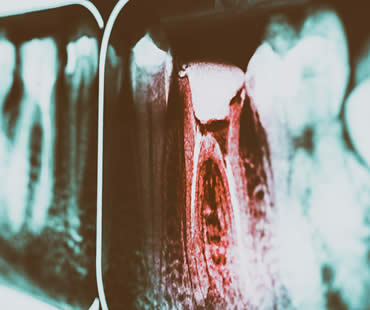
The desire for a beautiful, healthy, natural smile is universal. Dental procedures such as root canal treatments aren’t something people aspire to have, and there are things you can do personally that can reduce your risk of having a root canal procedure.
Prevention is the best step you can take to avoid root canal therapy, and it all begins with you at home. If you didn’t grow up with good oral hygiene habits, now is the time to develop them. This simple step can lead directly to good oral health. Be sure you are brushing your teeth at least twice a day, following each meal if possible, and absolutely before sleeping. If you don’t brush your teeth before bedtime, you’re providing a robust breeding ground for bacteria to grow and degrade your teeth while you’re sleeping. Floss daily to reach the places between teeth and beneath the gum line that brushing can’t reach.
Fluoride in your toothpaste and in mouthwash can keep your tooth enamel strong and durable. Never give fluoridated toothpastes to children under the age of two years and avoid fluoridated mouthwash until the child is more than six years old.
Maintaining a proper diet ensures that your body is receiving all of the nutrients it needs for health, both orally and elsewhere in the body. Chewing crunchy foods like raw vegetables and hard fruits can help keep your teeth bright and clean, scraping away debris while you chew.
If you are a smoker, you should stop immediately. Not only is it a huge factor in your oral health, but also for your overall health. Smoking contributes directly to lung disease, cancer and heart disease, as well as other health issues. Your dentist or doctor can give you excellent advice about quitting.
Stay hydrated by drinking lots of water and avoiding sugared drinks. Rinse your mouth after consuming soda, coffee, tea or a sports drink.
Be sure to see your dentist twice a year for regular check-ups and cleanings, and keep your risk of a root canal treatment low.
Our dental office is located in Baltimore

Having a hole in your smile is not only embarrassing or unsightly, it also impacts the function of your mouth. It’s much easier to eat and speak with a full set of teeth. In the past, dentures or bridges were the go-to solutions for missing teeth. Not anymore! Dental implants provide a secure and permanent way to restore your smile.
A dental implant is a titanium rod that creates an artificial tooth root in the location that yours is missing. It is surgically implanted into your jaw so that as it heals, it fuses with your jawbone and becomes a permanent part of your body. Once the area has healed, an artificial tooth is placed on top of the titanium rod to give you back a fully functional and attractive tooth.
Dental implants offer many advantages to patients:
- Permanent
- No impact to neighboring teeth
- Attractive and natural
- Feels like a real tooth
- Secure
- Prevents migration of teeth
Implants are installed using local anesthesia, so you will not experience pain during the procedure. Minor swelling may occur afterwards, and any pain can usually be treated with over-the-counter products. Risks are low with dental implants, and long-term results are successful in most cases. Good oral care is important in maintaining your implants, but is no different than your regular brushing and flossing routine. Regular checkups with your dentist will help ensure that your implant remains in your smile forever.
Schedule your appointment at our Baltimore dental office

If the prospect of a root canal procedure has you running for the hills, you may want to consider reading over this list of frequently asked questions before you end up cowering in a corner:
- What is root canal therapy? Root canal treatment is performed when decay or trauma has damaged a tooth causing it to die. A dentist or endodontist performs a procedure to remove the diseased or damaged pulp from the tooth and then refills the tooth cavity.
- Is root canal therapy painful? In reality, root canal treatment is intended to relieve pain, not cause it. Because the procedures are very similar, you should experience no more discomfort than having a cavity filled.
- What happens after root canal therapy? Your tooth may be slightly sensitive for a few days, but over-the-counter pain relievers are usually sufficient to relieve any pain you may experience. In order for your tooth to return to full functionality, a crown or other restoration will need to be placed after the root canal therapy is performed.
- What if I opt not to choose root canal therapy? Untreated damage or infection in your tooth can travel through the roots and lead to an abscess or larger infection.
- Is there an alternative to root canal therapy? You could relieve the pain and infection by having your tooth removed. However, this can cause problems such as bone loss, migration of teeth, and bite problems.
In the case of a severely damaged or decayed tooth, the ideal solution is to save your natural tooth through root canal therapy and restoration. Contrary to popular belief, a root canal procedure is no more uncomfortable than having a filling placed in a cavity, and can have enormous benefits to your long-term oral health. Consult with your dental professional to get answers to any other questions or concerns you may have regarding root canal therapy so you can alleviate your fears and return to your healthy smile.
We look forward to seeing you in our Baltimore dental office













